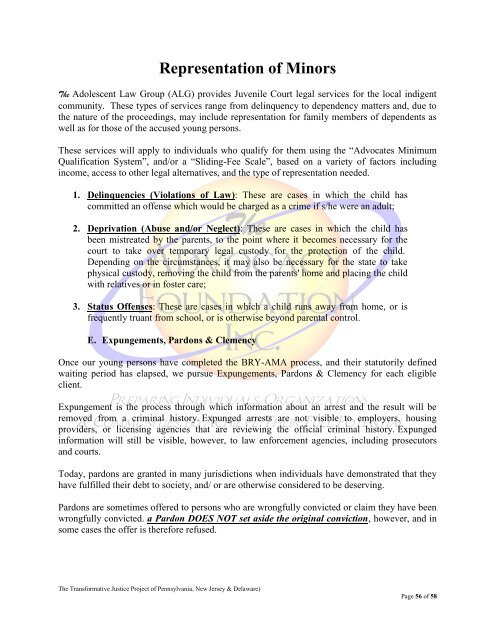The Transformative Justice Project of Pennsylvania, New Jersey & Delaware
The Transformative Justice Project of Pennsylvania, New Jersey & Delaware
The Transformative Justice Project of Pennsylvania, New Jersey & Delaware
Create successful ePaper yourself
Turn your PDF publications into a flip-book with our unique Google optimized e-Paper software.
Representation <strong>of</strong> Minors<br />
<strong>The</strong> Adolescent Law Group (ALG) provides Juvenile Court legal services for the local indigent<br />
community. <strong>The</strong>se types <strong>of</strong> services range from delinquency to dependency matters and, due to<br />
the nature <strong>of</strong> the proceedings, may include representation for family members <strong>of</strong> dependents as<br />
well as for those <strong>of</strong> the accused young persons.<br />
<strong>The</strong>se services will apply to individuals who qualify for them using the “Advocates Minimum<br />
Qualification System”, and/or a “Sliding-Fee Scale”, based on a variety <strong>of</strong> factors including<br />
income, access to other legal alternatives, and the type <strong>of</strong> representation needed.<br />
1. Delinquencies (Violations <strong>of</strong> Law): <strong>The</strong>se are cases in which the child has<br />
committed an <strong>of</strong>fense which would be charged as a crime if s/he were an adult;<br />
2. Deprivation (Abuse and/or Neglect): <strong>The</strong>se are cases in which the child has<br />
been mistreated by the parents, to the point where it becomes necessary for the<br />
court to take over temporary legal custody for the protection <strong>of</strong> the child.<br />
Depending on the circumstances, it may also be necessary for the state to take<br />
physical custody, removing the child from the parents' home and placing the child<br />
with relatives or in foster care;<br />
3. Status Offenses: <strong>The</strong>se are cases in which a child runs away from home, or is<br />
frequently truant from school, or is otherwise beyond parental control.<br />
E. Expungements, Pardons & Clemency<br />
Once our young persons have completed the BRY-AMA process, and their statutorily defined<br />
waiting period has elapsed, we pursue Expungements, Pardons & Clemency for each eligible<br />
client.<br />
Expungement is the process through which information about an arrest and the result will be<br />
removed from a criminal history. Expunged arrests are not visible to employers, housing<br />
providers, or licensing agencies that are reviewing the <strong>of</strong>ficial criminal history. Expunged<br />
information will still be visible, however, to law enforcement agencies, including prosecutors<br />
and courts.<br />
Today, pardons are granted in many jurisdictions when individuals have demonstrated that they<br />
have fulfilled their debt to society, and/ or are otherwise considered to be deserving.<br />
Pardons are sometimes <strong>of</strong>fered to persons who are wrongfully convicted or claim they have been<br />
wrongfully convicted. a Pardon DOES NOT set aside the original conviction, however, and in<br />
some cases the <strong>of</strong>fer is therefore refused.<br />
<strong>The</strong> <strong>Transformative</strong> <strong>Justice</strong> <strong>Project</strong> <strong>of</strong> <strong>Pennsylvania</strong>, <strong>New</strong> <strong>Jersey</strong> & <strong>Delaware</strong>)<br />
Page 56 <strong>of</strong> 58

















